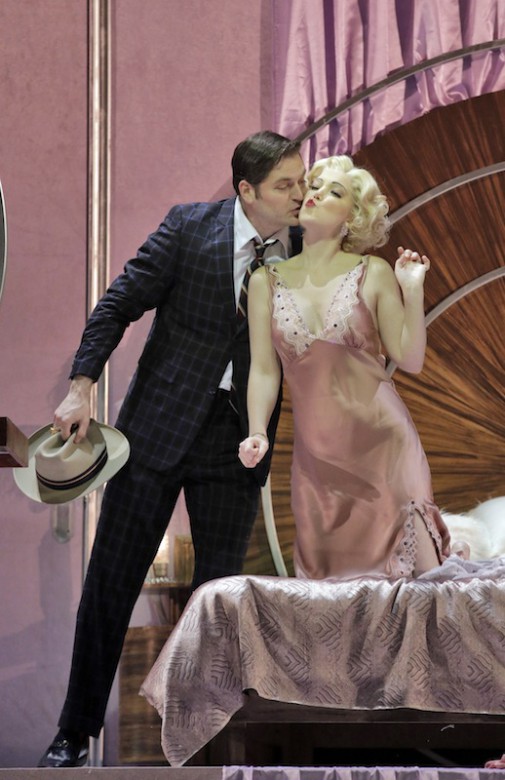Bolcom’s “Dinner at Eight” has a mixed premiere at Minnesota Opera

Craig Irvin as Dan Packard and Susannah Biller as Kitty Packard in William Bolcom’s “Dinner at Eight” at Minnesota Opera. Photo: Cory Weaver
Dying is easy, comedy is difficult.
William Bolcom’s Dinner at Eight had its debut last Saturday at Minnesota Opera in St. Paul. A co-production with the Wexford Festival and Atlanta Opera, the American composer’s new opera is an autumnal work with a libretto by Mark Campbell (Silent Night, The (R)evolution of Steven Jobs). Yet despite a terrific singing and acting cast, the opera proved a mixed, dramatically unsatisfying work in its world premiere.
Dinner at Eight is based upon the hit 1932 Broadway play by George S. Kaufman and Edna Ferber about the wealthy Jordan family who are planning a high society dinner for their many friends and acquaintances. The MGM film made the following year also proved successful with an all-star cast including John Barrymore, Marie Dressler, Wallace Beery, Jean Harlow and Lionel Barrymore.
This story is a curious choice to use for an opera in 2017. It begins with an unending sequence of the follies of several extremely rich people who are soon to be poor, or who have already been felled by the Depression and are now poor. There is an actress on an age-related downward slope, and an actor losing roles because of his alcoholism. We meet a wheeler-dealer who is ruthless enough to survive at any cost and headed to a big position in Washington D.C. The opera ends with everyone disappointed and thrashing around to hold on to their money or to hang on dearly to some sort of love.
If a dark comedy means a caustic look at the human condition, this opera certainly has the raw material. By the time the final curtain rolls around, one character has committed suicide, another has been given devastating news by his physician, both a marriage and an engagement are strained by infidelity, careers are ended, and a family firm is lost to a hostile takeover.
Yet even in today’s economically hard times for many, the Depression Era story and characters seems so dated and not of this world that it made it difficult for the Ordway Theatre audience to buy into their lives and dilemmas. I doubt that any music or libretto could make the audience care about these people. And with so many competing story lines, Dinner at Eight was often directionless, with no discernible broader arc to the story.
In the opera audiences of 2017, anxiety exists that is troubled by the fragility of relationships, corporate governance, the ravages of drugs and alcohol, and perhaps a sense of fear about the future of nations. What kind of music could William Bolcom write that could cause a smile or a sense of recognition of the highs and lows of life shared by every economic class?
Bolcom’s music is characteristically populist in style, distinctly 21st century yet tuneful enough that listeners who cherish opera of the 19th century would be untroubled by the score. Every major character gets their moment alone on stage to sing a major aria, and Bolcom writes masterfully for each. While the orchestra could be lush and expansive during non-singing moments, it seamlessly pulled back to chamber size during singing.
Mary Dunleavy had a brilliant soprano voice as the hostess whose lobster aspic has fallen, Millicent Jordan. Her diction was crystal clear with shimmering top notes. Stephen Powell was her husband Oliver Jordan, the failing business man, and sang in a smooth and secure baritone voice. His portrayal was perhaps the most sympathetic of the opera, and Powell’s diction made the use of supertitles almost unnecessary.
Brenda Harris can inhabit any role convincingly. As the fading actress, Carlotta Vance, she was poignantly aware that she was out of money and why this was happening. Harris sang with a great richness in the middle and low registers, yet with a coloratura’s sparkle in the upper tones.
Craig Irvin was aptly heartless and blustering as Dan Packard, who brings the Oliver Jordan company to its knees, singing with a big, commanding baritone. Susannah Biller sings the role of Kitty Packard. The blonde schemer entices her doctor to be a paramour and, in times of stress, eats from what is likely the largest heart-shaped box of chocolates ever seen on stage.
Richard Troxell sang the role of washed-up alcoholic actor Larry Renault. Troxell’s singing was vibrant and brought a very clearly observed image of a man in a death spiral to the audience. The director did Troxell no favors by encouraging some hamminess in his “need for a drink” scene.
Campbell’s conversational libretto made the story line move clearly and naturally throughout. Minnesota Opera lists a sound designer in the credits, which indicates amplification of some sort. The miking was discreet but the amplification does yield some whitening of sound for everyone in the cast–in addition to the sonic unreality of a singer facing away from the stage emerging with perfect clarity.
Alexander Dodge created a stunning set, a huge and sumptuous Art Deco-influenced design atmospheric of New York in the early 1930’s. Individual scenes flying or are wheeled in with no disruption. David Agler, artistic director of the Wexford Festival, conducted the Bolcom score with precision and clarity.
Dinner at Eight runs through Sunday. minnesotaopera.org